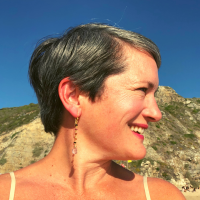In the first Fall of this Pandemic, I met a friend for a bite at an outdoor restaurant in Boulder.
It was our first date since COVID-19 had restructured our world, and the thrill of dining out together was not lost on either of us.
As we waited for our meals to come, we couldn’t help but notice a young, blonde woman, probably in her early-30s, dining a safe distance from us.
Her friend was taunting and teasing her—the blonde woman was laughing, albeit a bit uncomfortably.
Suddenly, she stood up, her long, blonde hair cascading around her shoulders, and exclaimed, “I can do it! I can do it! I’ve got to do it!”
“Do what?” my friend and I asked.
Before answering, she sat back down, dejectedly. “I can’t do it.”
It was then that I noticed her cane.
Leaning against her table was an elegantly shaped wooden cane that looked like it had been fashioned for an empress. The top, where her hand rested, was intricately carved into the shape of a bird, gleaming white. It was lovely, just like the young woman.
My friend and I were intrigued, and she was more than happy to tell us her story.
She had been a professional flautist with a promising career. She used to play in a symphony on the East Coast. She used to run a few miles a day.
Then, in early 2020, she became terribly ill. Her doctors couldn’t figure out what was wrong; they didn’t take her seriously and failed to diagnose her properly. After suffering for almost half a year, she found new doctors and finally discovered she had COVID-19.
The virus had disrupted her life. No longer able to play the flute, she could barely walk around the block. Since she’d lost her career, she decided to try a fresh start in a new town. The Empress, as I would later call her, chose Boulder because she had friends here.
Her friend was trying to get her to go inside the practically empty restaurant, but she had become terrified of indoor public spaces.
Awestruck by her vulnerability and upbeat personality, my friend and I encouraged her to keep healing. When I gave her my card, the Empress said, “If you know anyone who isn’t taking Covid seriously, I’ll find them and talk some sense into them.” Then she lifted her beautiful cane playfully.
I think of the Empress when I read someone’s Facebook post proclaiming their supreme faith in the immune system (hint, hint: I don’t need no vaccine).
But being young and fit, and having the lungs of a flautist, hadn’t helped the Empress.
I wonder how posts blasting the “hyped severity” of Covid land for the families who’ve lost loved ones to the disease? It’s just a cold. It’s no worse than the flu. You think?
The flu killed 52,000 people in the United States during the 2017 to 2018 season (the highest flu mortality rate in the previous decade).
Covid killed 352,000 Americans in 2020 (and 2021 is proving even deadlier).
Covid is now the third leading cause of death in the USA, pushing suicide off the top-10 list.
One out of every 100 Americans over the age of 65 has died from Covid.
So before complaining about wearing masks or resisting taking Covid tests before public gatherings this holiday, consider how some elders (or those who are immune-compromised) are feeling as they enter their second holiday as (more or less) shut-ins.
Think about how downplaying the disease might land for the hundreds of millions of people worldwide who have “long Covid.” These unfortunate folks experience debilitating symptoms for months, even years, after the initial infection, which may have been mild.
Long Covid doesn’t just afflict the elderly either. Estimates are between 2 to 10 percent of young people who get infections may experience long Covid.
Being white and privileged, with great health care and a plethora of supplements at the ready, does not make you heroic.
The knowledge and wherewithal to get “platinum” medical care or expensive supplements is something to be grateful for—just please don’t brag about it. Think about how your status squares with Native Americans in this country, many of whom have poor health care access, and half of whom experienced financial hardship even pre-pandemic.
Tragically, Native Americans, along with people of color, have watched their community members perish to Covid at alarming rates. So when you sit down to your well-appointed holiday meals, imagine what gaping holes Covid has left in so many families and tribes.
Despite writing optimistically here last summer about possibly turning the corner on the pandemic, the end is clearly nowhere in sight. While some states are seeing greater hospitalizations than ever, more than 1,000 people are dying from Covid every day in the USA.
It’s worth noting that although there are more and more breakthrough cases, as vaccine protection wanes, the vast majority of folks forced to go to the hospital from Covid—or dying there—are unvaccinated.
So whatever storyline you’re telling this holiday, please remember that epidemiology is a complex science requiring advanced degrees to practice. Yes, governments, scientists, and others have gotten it wrong along the way. That doesn’t mean they’re all trying to kill us.
Covid-19 is proving to be a relentless and unpredictable virus. Some folks get a sniffle. Others take their last breath within days.
Omicron may be milder. Or maybe not. Perhaps not for the unvaccinated (nor those with natural immunity, who also appear to be less protected from this new variant).
In the face of so many unknowns, let’s try humbleness.
Two years into a pandemic that’s pitting friends, families, and political parties against each other, I pray we dig ever deeper—to the roots of our shared humanity—in the wide mess of it.
So Happy New Year to all of us weary humans.
However you choose to celebrate this holiday season, may the gift of humbleness break your heart open to the fragility of life, to the incredible power we have to impact each other, and to our responsibility to care for all of life on this wondrous planet.
And to anyone who still thinks lightly of this invisible foe, may the Empress and her beautiful cane find you.












Read 4 comments and reply